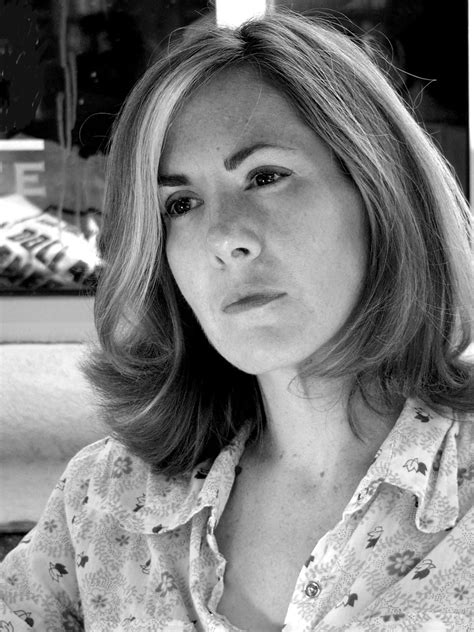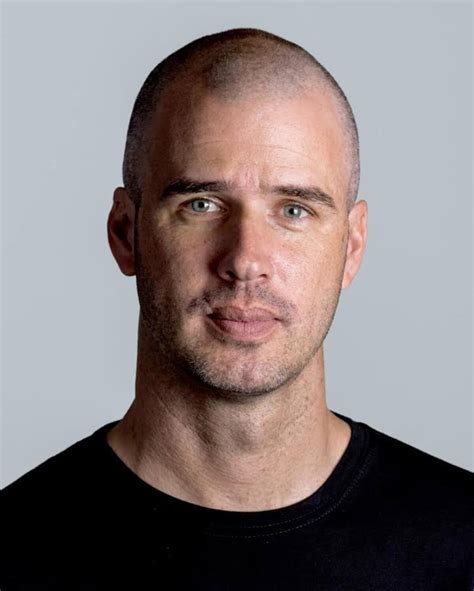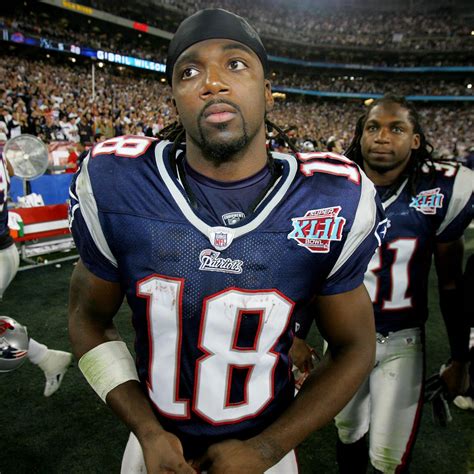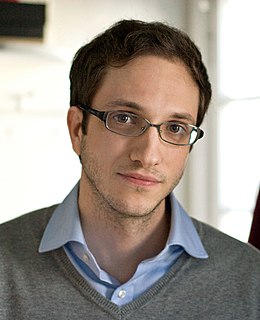Top 360 Stigma Quotes & Sayings - Page 6
Explore popular Stigma quotes.
Last updated on April 16, 2025.
I can think of so many tough guys that by definition it's their job to be tough and they're all in chapel. That's such a misconception and it's kind of gone out the window. Guys feel more comfortable going to chapel. I remember when I first started, guys were nervous about it and it was kind of a secret. There was still that stigma that came with it, but it's definitely been removed and (the faith movement) is definitely growing.
Young women who come to Rise every weekend range from ages 15-19 years if they're in school and 19-24 years if they're out of school. These empowered young women talk about protecting themselves, their friends and communities and how they can educate people to help break the stigma surrounding AIDS.
There is enormous shame around depression of any kind and at any time. And there's enormous social stigma attached to it, which we need to go on fighting. But I think that the sense of depression during pregnancy and early motherhood has been particularly stigmatized, that people especially feel that should be the happiest time of your life.
Failure seems to be regarded as the one unpardonable crime, success as the all-redeeming virtue, the acquisition of wealth as the single worthy aim of life. Ten years ago such revelations as these of the Erie Railway would have sent a shudder through the community, and would have placed a stigma on every man who had had to do them. Now they merely incite others to surpass by yet bolder outrages and more corrupt combinations.
Oh! Be men, or be more than men. Be steady to your purposes and firm as a rock. This ice is not made of such stuff as your hearts may be; it is mutable and cannot withstand you if you say that it shall not. Do not return to your families with the stigma of disgrace marked on your brows. Return as heroes who have fought and conquered, and who know not what it is to turn their backs on the foe.
There is no denying that unhappiness - even violence - exists in some arranged marriages. Or that some arranged marriages are borne out of cruelty. And part of that six percent global divorce rate can be attributed to the powerful stigma against divorce that's present in countries where arranged marriage is common.
Models have a stigma that they can't act. You're also, to be quite blunt, you're tall and not a lot of actors are tall and when you are starting out you're obviously not the first one cast, so you're trying to fit into a mold. You're quite often not cast as the quirky best friend, but you don't have the experience to be cast as the lead. So it can be really tricky. One of the biggest things is just to get your people, so to speak, your agents and managers to take you seriously. That's one of the issues I had when I came out to LA.
If you go off into general-interest magazines, often women are being shoved aside into various ghettos that perpetuate the problem. Women's interests are specialized, they're secondary; they're somewhere over to the side of the serious work that's being done. Throughout history, there have been ladies' magazines, ladies' journals, and for years there have been women writers who would refuse to participate in women-only sort projects because of that stigma.
A lot of authors see their book being banned or challenged as a badge of honor. But for me, it's nothing but frustrating and upsetting. I hear from readers that my work encouraged them to ask for help or reach out to someone about the situation they're in. When you hear stories like that on a daily basis and then hear adults call for your work to be banned, it's proof of why the stigma around these issues is so dangerous.
We're all in this together. It's okay to be honest. It's okay to ask for help. It's okay to say you're stuck, or that you're haunted or that you can't begin to let go. We can all relate to those things. Screw the stigma that says otherwise. Break the silence and break the cycle, for you are more than just your pain. You are not alone. And people need other people.
And the stigma hasn't really changed that much in 31 years. You are still getting people - it's a shame-based disease. It's based on sexual transmission. And it's still shame-based. And until people feel strong enough and feel loved enough to actually open up and say, listen, I'm HIV-positive, then we are facing an uphill battle.
I'm more critical of my songwriting than anybody, but I've worked really hard in the last five to 10 years to improve. I didn't take it all that seriously when I started. It was a little bit of a stigma to being a songwriter or a folkie back then. I did a lot of send-ups of sensitive singer-songwriter stuff when I was starting out, which limited my development as a songwriter in a way. I wasn't really fully given license to explore that until the mid-90s. I'm still working on it; I'm a little bit of a late bloomer.
The notion that "applied" knowledge is somehow less worthy than "pure" knowledge, was natural to a society in which all useful work was performed by slaves and serfs, and in which industry was controlled by the models set by custom rather than by intelligence. Science, or the highest knowing, was then identified with pure theorizing, apart from all application in the uses of life; and knowledge relating to useful arts suffered the stigma attaching to the classes who engaged in them.
I spent the past week here in India getting a sense of the reality of HIV and AIDS in people's lives. Fathers and mothers are dying, leaving children with no support. Stigma and discrimination is ruining the family lives. There is an urgent need for education, information, and increased awareness of HIV and AIDS. The response needs to be now. We cannot afford to become fatigued.
We think that if we get tested, that means you have to have HIV. Or we think that just by knowing someone with HIV, we're going to get HIV or because he's gay or she's a lesbian or whatever. This false information has been put out there and it's created this stigma that stops us from going to find out if we're infected. The truth is it doesn't matter who you are, if you're having sex, you need to be getting tested, plain and simple.
It is in the twenties that the actual momentum of life begins to slacken, and it is a simple soul indeed to whom as many things are as significant and meaningful at thirty as at ten years before. At thirty an organ-grinder is a more or less a moth eaten man who grinds an organ - and once he was an organ-grinder! The unmistakable stigma of humanity touches all those impersonal and beautiful things that only youth ever grasps in their impersonal glory.
[Keeping kosher was] the symbol of an initiation, like the insignia of a secret brotherhood, that set her apart and gave her freedom and dignity. Every law whose yoke she accepted willingly seemed to add to her freedom: she herself had chosen . . . To enter that brotherhood. Her Judaism was no longer a stigma, a meaningless accident of birth from which she could escape . . . It had become a distinction, the essence of her self-hood, what she was, what she wanted to be, not merely what she happened to be.
I was so lucky. I had a dad and a mom that loved me and my sisters so much. My Uncle Mike and Uncle Frank were married. They must be together for fortysomething years now. Long story short, there was never any stigma attached to that. At the youngest age, I remember my dad saying, "Sometimes men love men and women love women. It's nature.
Just take the negro child. Take the white child. The white child, although it has not committed any of the per - as a person has not committed any of the deeds that has produced the plight that the negro finds himself in, is he guiltless? The only way you can determine that is, take the negro child who's only four-years-old. Can he escape, though he's only four years old, can he escape the stigma of discrimination and segregation? He's only four-years-old.
There has been a stigma around letting movies be seen on home screens on the same day as theatrical screens. Universal said they were going to do it with 'Tower Heist,' but they backed off when challenged by the theater owners. I understand where the theater owners are coming from on big studio movies.
Children who have lost parents to HIV/AIDS are not only just as deserving of an education as any other children, but they may need that education even more. Being part of a school environment will prepare them for the future, while helping to remove the stigma and discrimination unfortunately associated with AIDS.
'Dungeons and Dragons' has evolved over the years, and so has the community that played the game. It had a lot of lingering stigma from the anti-'D&D' movement of the '70s and '80s - this kind of idea that 'Dungeons and Dragons' is only played by the lowest of the low basement dwellers - that has kept people from being comfortable talking about it.
Remus Lupin was supposed to be on the H.I.V. metaphor. It was someone who had been infected young, who suffered stigma, who had a fear of infecting others, who was terrified he would pass on his condition to his son. And it was a way of examining prejudice, unwarranted prejudice towards a group of people. And also, examining why people might become embittered when they're treated that unfairly.
I spoke so much about being a manic-depressive. I want to bring everyone back to my earliest memories of this companion of mine. Some people call this companion I have an ailment, or worse a terrible nightmare from which some people cannot awaken. I know that I have nothing to be ashamed of. I have nothing that should garner a stigma.
When I did Mira Nair's film on AIDS, people told me to stay away from it and even asked me reasons why I chose to do a film on the stigma. My reason for choosing the movie is similar. It is a social reality and there is no harm being a part of a movie like this as it really dissects the reality of the crisis.
The mental cognitive processes that we're targeting are ones that narrow human beings' repertoire and make it harder for them to learn to be more flexible, to take advantage of the opportunities in front of them. We can have something to help with in areas like child development or organizations and schools, or maybe even how peoples interact with each other, one to the other. We've taken the work into things like prejudice and stigma, because if we can't solve that we have planes flying into buildings. So it applies broadly because anywhere that a human mind goes these processes go.
Day 1, when I was drafted to the Toronto Raptors, they had this stigma on them: Every guy leaves. Nobody wants to be here. Superstars, nobody wants to play in Canada. From Day 1, my whole mindset and approach to the game, being in Toronto, was I wanted to change that whole narrative to that whole organization.
Since I come from a family of mental instability, and I have suffered depression myself, I knew that living in shame is senseless and painful, and that by talking about it, I have come to peace with it. The stigma behind people's suffering needs to end. We as a community need to embrace these disorders, try to understand them (if only just to talk about them) so that we can cease being defined by them.
There's such a high stigma around talking about your feelings or insecurities because, especially for men, we don't want to show that "weakness." But I'm always like, "OK, what would you rather do: Show weakness and get better, or continue to get worse and who knows where that leads?" There's something behind the suicide rate continuing to climb year after year. Why don't we ask for help?
Soaps are great. You learn to work very fast - some say superficially, but that's not really true. You do some very serious character work. I've never had any feelings about a stigma attached to it, and nowadays there seems to be less snobbery about what you do. More and more big names are doing TV and commercials and voiceovers.
I had to fight to be me and get respect, and to carry that stigma, for me, is pride. Carrying the tag of lesbian. I'm not bragging, I'm not preaching, but I don't deny it . I had to face society, the Church, which says damn gay people ... it's absurd. How do you judge someone who has been born that way. I did not study to be a lesbian. Neither was it taught to me. I was born this way. Since I opened my eyes to the world. I've never slept with a man. Never. I'm pure, I don't have to be ashamed ... My Gods made me so.
I think that the whole stigma of the name may still burn deep with some of the Native people, but there are some that it doesn't bother. They actually think it brings enlightenment to the contributions that the Native Americans had in the establishment of our country, but I haven't come up with an idea. I'm not saying the name "Redskins" wasn't derogatory, but the actual changing the name to the Washington Redskins was an honorary move.
Say you're a sex worker and your partner knows you're a sex worker, but you're not out to your family. That could be very dangerous, particularly in an unhealthy relationship, where it could be a recipe for conflict, for something potentially violent that could lead to someone going to jail. There's so much pressure because of the criminalization and stigma. If we lifted that, it's only going to benefit more women.
I think the scariest addiction on this planet is to alcohol. Because alcohol is a very addictive drug, and it ruins families, it ruins relationships. And it is socially acceptable, and it is easy to find. Controlled substances, other drugs are more difficult to get, and it's a crime to... to buy them. But alcohol is everywhere. And if you are unfortunate enough to become addicted to it, it can be disastrous. And there is still a stigma attached to alcohol addiction, or addiction in general. It is perceived as... an addict is perceived as somebody of weak moral fiber
America is the greatest engine of innovation that has ever existed, and it can't be duplicated anytime soon, because it is the product of a multitude of factors: extreme freedom of thought, an emphasis on independent thinking, a steady immigration of new minds, a risk-taking culture with no stigma attached to trying and failing, a noncorrupt bureaucracy, and financial markets and a venture capital system that are unrivaled at taking new ideas and turning them into global products.
There is so much closed-mindedness, there is so much closed-off thought, there is so much bigotry and prejudice within knowledge that it, I think, is stunting the actual intelligence growth of our population. Not our capabilities but our actual intelligence growth because all of the stigma that's attached to people that don't have formal educations as opposed to those who do. But the people that have formal educations have been programmed and indoctrinated in many cases, not in all the disciplines.
Being a figurehead for those with family members in prison is somewhat new for me. Something I've discovered since my father's incarceration is that the prison system is broken. My first-hand experiences have taught me that reform needs to happen sooner than later. I'm most interested in mentoring children with parents in prison. When a parent is sentenced to a jail term, the child is sentenced to the same time to be spent without a mother or father. No child should suffer a stigma or lack support and guidance because of the sins of a parent.
Even with all that - excellent treatment, wonderful family and friends, supportive work environment - I did not make my illness public until relatively late in life, and that's because the stigma against mental illness is so powerful that I didn't feel safe with people knowing. If you hear nothing else today, please hear this: There are not 'schizophrenics'. There are people with schizophrenia, and these people may be your spouse, they may be your child, they may be your neighbor, they may be your friend, they may be your coworker.
We need to start identifying the triggers that aggravate mental health issues in our society - bullying, social media negativity and anxiety, gender based violence, substance abuse, stigma around issues such as maternal issues, etc., and we need to speak up about these more and get to the source of the problems.
The climate is much different for men. That stigma is only going to be broken when people come out and see that there is a positive response. That doesn't mean there will be no negative response, but if people can have the courage to be one of the first, which is very hard, those barriers can be broken down very quickly.
Our children are our signature to the roster of history; our land is merely the place our money was made. There is as yet no social stigma in the possession of a gullied farm, a wrecked forest, or a polluted stream, provided the dividends suffice to send the youngsters to college. Whatever ails the land, the government will fix it.
One out of four kids in Lesotho has AIDS, and the idea of the charity is to help the children first fight the stigma of living with HIV and then teach them how to live with it and survive and get an education so all these children can have a normal life. When you're changing the life of so many kids - one out of four is a big number - you change the direction of an entire nation.
The term 'web-series' has a stigma attached to it because it was created at a time when the only web-series that were being created were being created by people who would have loved to have a television show, but they couldn't. So they created a web-series instead, on their own dime. And those series look cheap because of it.
We do know that a percentage of LGBT people avoid and delay screening and care because of fear about or experience of stigma, discrimination or simply lack of knowledge about LGBT people and their health amongst providers. If you avoid or delay screening and care and you have an issue that may be precancerous, by the time you get into screening and care you’re there because it has become acute and you already have a progressed disease.
They are not brave, the days when we are twenty-one. They are full of little cowardices, little fears without foundation, and one is so easily bruised, so swiftly wounded, one falls to the first barbed word. To-day, wrapped in the complacent armour of approaching middle age, the infinitesimal pricks of day by day brush one but lightly and are soon forgotten, but then—how a careless word would linger, becoming a fiery stigma, and how a look, a glance over a shoulder, branded themselves as things eternal.
We can prevent more people from becoming more addicted - that's number one - with prescribing laws and making sure that people can't get too many of these opioids when they are initially prescribed them. Number two is, we have to make sure the millions of people who are already addicted have access to good and effective treatment. Finally, it's critical that we remove stigma and that's why we've made a film, to show that this can happen to anyone.
The ball scene was never really only gay people. I think people have this notion that if there's a man hanging around a gay man, he must be gay, but that's just stigma. Back in the day, it was the same; there were lots of different people there: gay, straight, whatever. They did not care what they were called because they knew who they were.
The AIDS disease is caused by a virus, but the AIDS epidemic is not. The AIDS epidemic is fueled by stigma, by hate, by misinformation, by ignorance, by indifference. Science has accomplished miracles over the past 20 years, and science can now end this disease - but it cannot end the epidemic. We need more than medicine. We can do something about these things. We need to speak out about the changes we need to make in our society.
Those who have prophesied dreadful consequences as a result of the greater sexual freedom which the young assert - unwanted babies, venereal disease and so on - are usually the very same people who seek the fulfillment of their prophecies by opposing the free availability to the young of contraception and the removal of the stigma and mystification that surround venereal disease.
There's so much stigma around HIV/AIDS. It's a challenging issue, and the people that already have been tested and know their status find it very, very hard to disclose their status, to live with that virus, and to even seek out the kind of information they need. This experience of going to South Africa a decade ago really woke me up to the scale of the HIV/AIDS pandemic in sub-Saharan Africa, how it was affecting women and their children. I haven't been able to walk away from it.
The housewife is an unpaid worker in her husband's house in return for the security of being a permanent employee: hers is the reductio ad absurdum of the employee who accepts a lower wage in return for permanence of his employment. But the lowest paid employees can be and are laid off, and so are wives. They have no savings, no skills which they can bargain with elsewhere, and they must bear the stigma of having been sacked.
I went public with the alcoholism, very early on... the early '70s. Mercedes McCambridge, the actress, I think was the first recognizable person that went before Congress and talked about it, and I thought that was a good idea, to take some of the stigma away from it and say "Normal, average people can fall prey to it." So it's been public for me. I did a movie about an alcoholic. And today, you're nobody unless you've been to rehab. It seems like everybody has some kind of an addiction.
























































